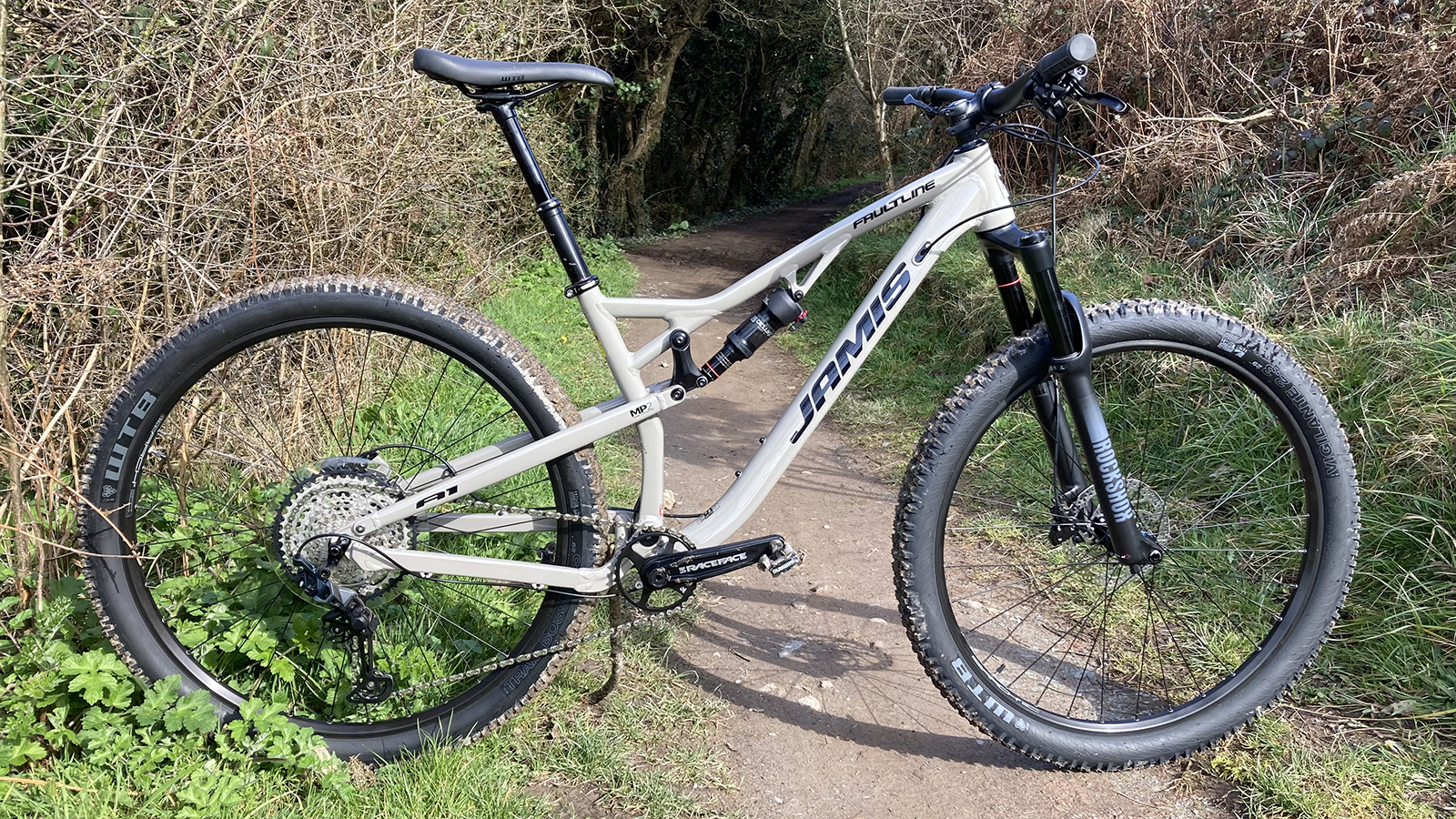
The Faultline A1 is the highest spec offering from US brand Jamis, it's available across the US and from Go Outdoors in the UK. At $2,599 or £2,100 (if bought with the £5 members card), there are cheaper budget MTB options available, so it it needs to perform well out on the trail to make its mark.
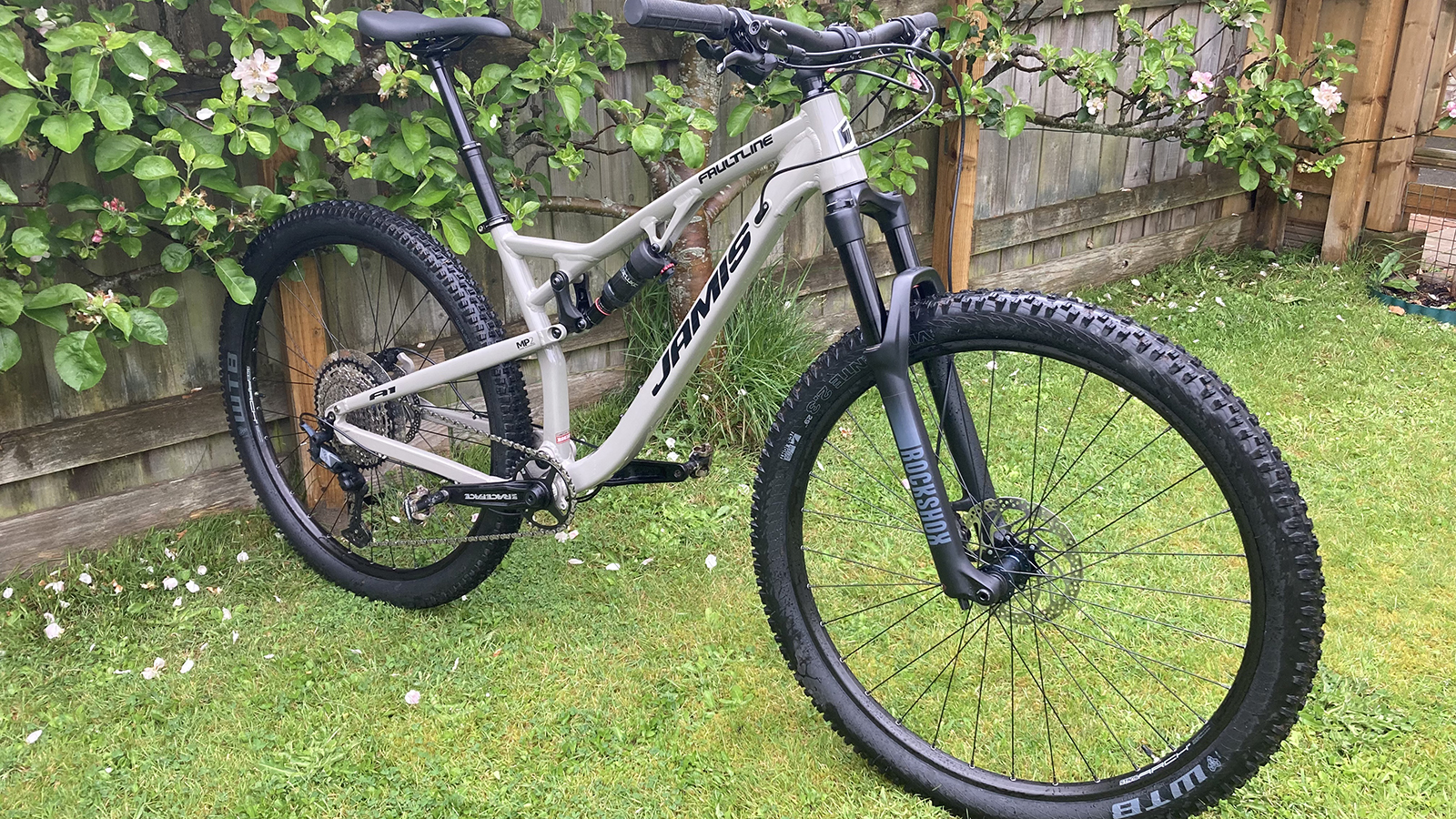
Design and geometry
The Faultline A1 arrives in a box with a bit of customer assembly required before hitting the trails, and Go Outdoors provides a helpful video to help the less confident. Out of the box the A1 looks very premium; the paint job is faultless and the aluminum head badge and subtle graphics add to the look. The frame is neatly welded triple-butted 6061 alloy, and Jamis has made use of hydro-forming to add shape and character to the frame design, particularly the top tube that kinks dramatically before joining the seat tube. The Faultline A1 uses Jamis' established MP2 suspension layout, which is essentially a single pivot design that places the shock directly under the top tube and provides 120mm of travel. The head tube is of the tapered variety, which is not always a given at this end of the market, and I was pleased to see the rear end is 12 x 148mm boost width for extra stability. The cables are internally routed, with neat cable ports screwed into place, and ISCG05 tabs are provided for a chainguard if you feel the need. It's a good-looking bike.
Now we get onto the elephant in the room – that seat angle! Jamis lists the seat angle at 74 degrees and the head angle at 67.5 degrees; these are a little conservative for today's longer, lower, slacker trend, but just about OK for an all-rounder with 120mm travel. However, straight out of the box the seat looked far too laid-back, and a quick measure of the effective seat angle, which has much more relevance to how a bike fits and rides, revealed a 71 degree seat angle; the 74 degrees that Jamis lists only refers to the angle of the kinked seat tube itself. The result is your actual seated position is way behind the bottom bracket, which dramatically affects climbing in a seated position and has a knock-on effect on the reach and length of the bike which we'll come onto later.
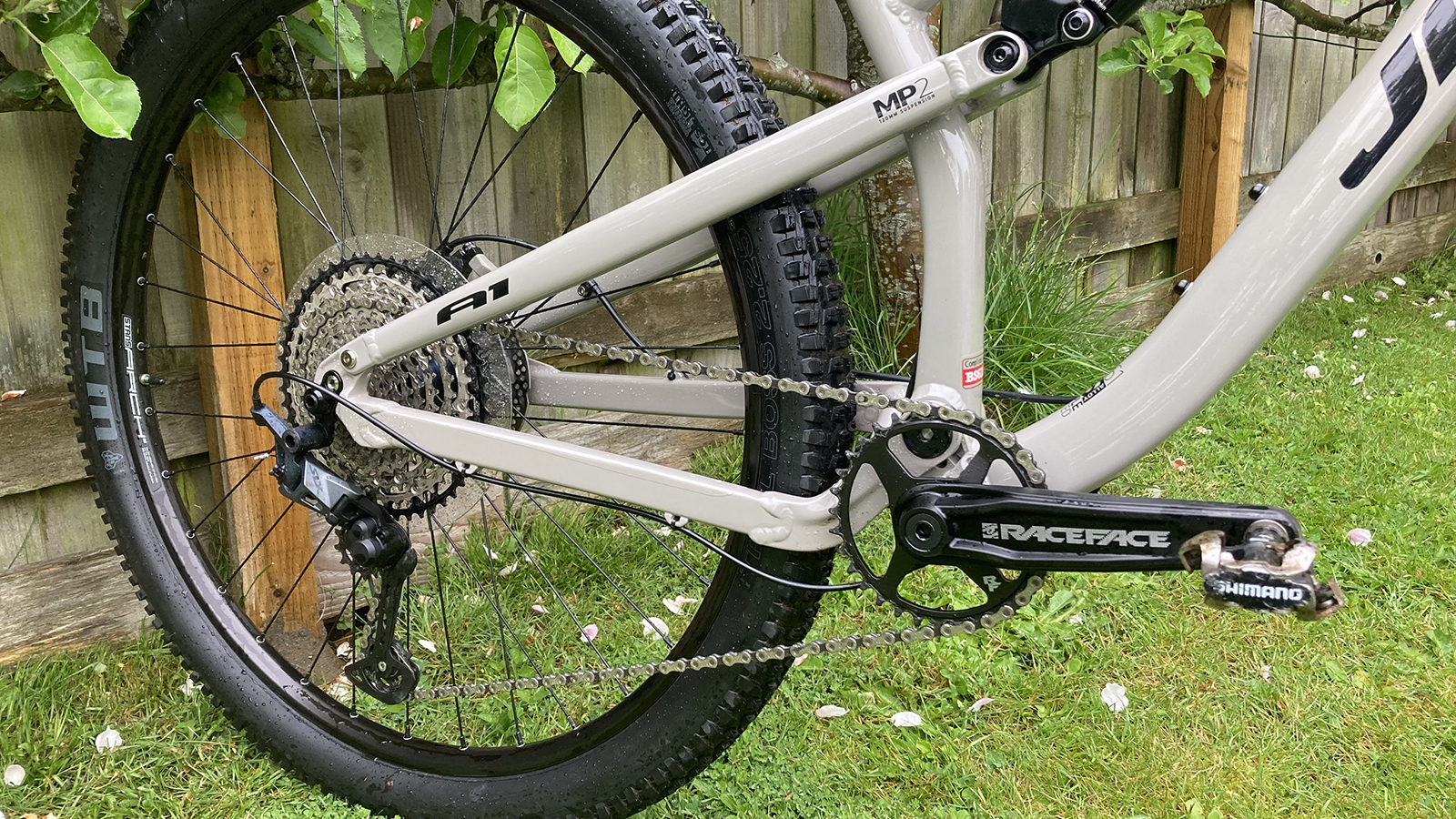
Components and build
Jamis has done a great job with the component list for the Faultline A1, and it would do well in a game of top trumps with comparable £2k offerings. The suspension is taken care of by Rockshox with a Deluxe Select+ RL at the rear, and a 35 Gold RL fork with 130mm of suspension travel up front.
The transmission is where the spec really impressed, with a Shimano SLX 12-speed dérailleur and shifter, a Shimano Micro Spline 10-51t cassette, and a premium looking Race Face Ride chainset. The only cost-cutting on the transmission appears to be the chain, where Jamis has opted for a cheaper 12-speed KMC chain.
The brakes are Shimano MT400s which have rather long levers, but these can be set up slightly inboard to provide even more leverage. Reach adjustment is also a bit fiddly with a 2mm Allen key, but once set up the MT400s proved dependable throughout testing.
The cockpit comprises of a Race Face Ride stem (50mm) and handlebar (760mm), and Jamis' own branded lock-on grips. The saddle is a WTB Volt, one of my personal favorites. A KS Rage Dropper comes as standard with an under bar lever.
Finally the wheels, which really are a good-looking set of hoops, with Stan's No Tubes Arch D tubeless rims laced to Shimano SLX hubs, fitted with a WTB Vigilante 2.35” tire up front and a WTB Trail Boss 2.25 out back. On paper there really isn't much to complain about with regard to the component choices.
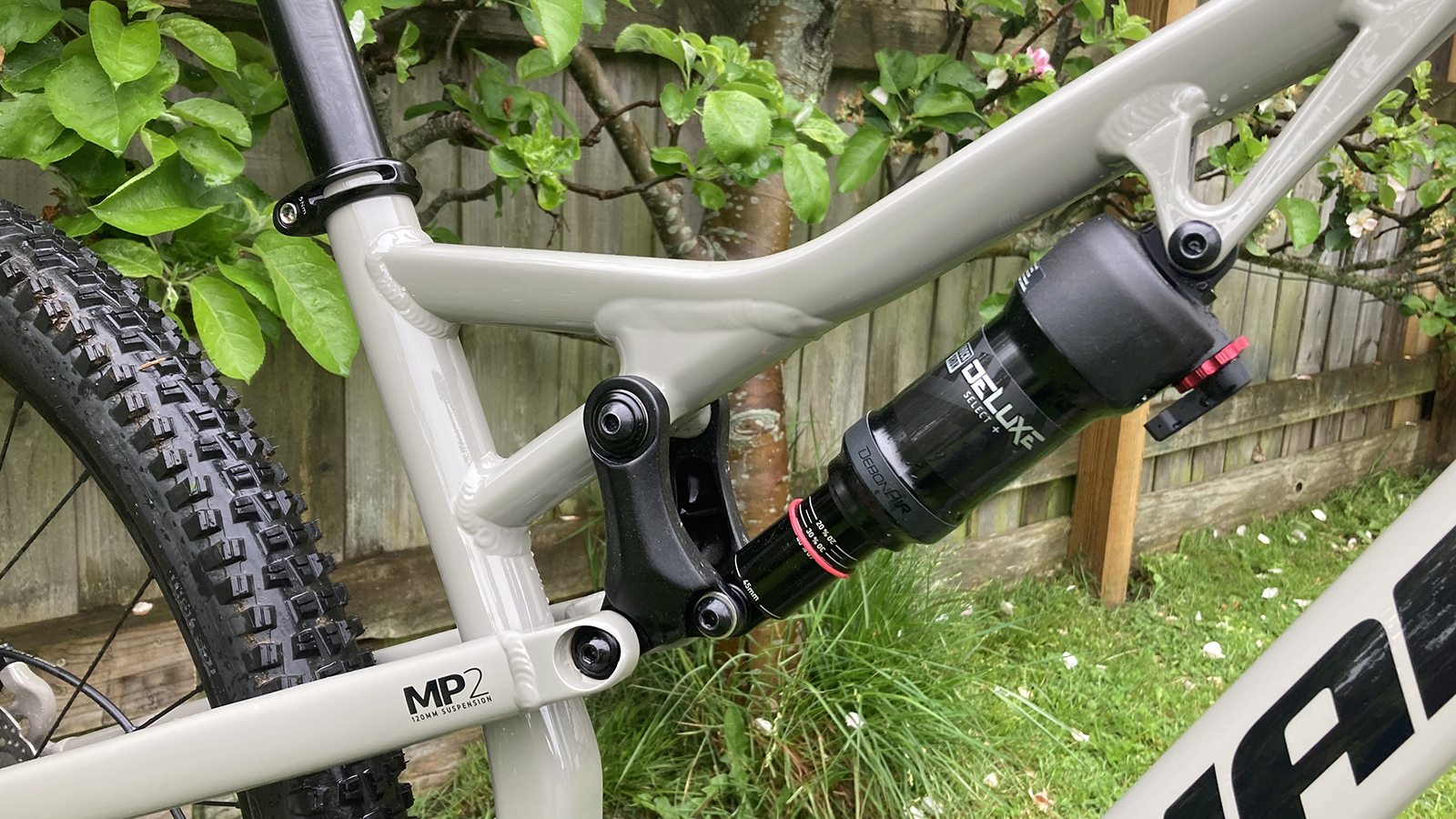
Ride, handling and performance
Once the Faultline had been put together, the suspension was relatively easy to set up. The rear shock has markings to help, but for the fork, you'll need a tape measure and calculator. I set them both with between 25 and 30 percent sag. I found both units to be very heavily damped, and as I weigh in at 74kg, I needed the front fork rebound adjusted fully open, and only two clicks from fully open on the rear shock. For lighter riders this may be a problem, as an overdamped setup can feel very sluggish on the trails.
I'm on the upper limit for a size medium, and needed the 100mm KS Rage dropper set to its minimum insertion. When I checked the distance to the bars, I was pleasantly surprised that it was similar to my normal trail bike setup. After a bit more checking with the tape measure, it became apparent that this was mainly due to the very laid-back position of the saddle, as the reach isn't particularly long at 438mm on the size medium frame.
On the trail the Faultline A1 started off great. Everything worked as expected and I felt comfortable in a seated position. It's only when tackling steeper climbs that the laid-back seat position makes itself known. Your hips are positioned too far behind the bottom bracket, making it difficult and near impossible to apply the pedal power needed. The front of the Faultline A1, with its tapered head tube and 35mm fork stanchions, felt very solid when descending and allowed me to push into corners without any noticeable flex, and held lines really well.
The front and rear suspension worked well together, with a nicely balanced ride characteristic. They both feel quite linear in how they get through their travel, and lack the progressive ramp up in support you get with more expensive shocks. The result is the suspension can feel a bit harsh on longer descents, but this really isn't a hard-hitting bike, and in most circumstances it behaved well.
The WTB tires performed well in dry conditions, but the relatively hard compound struggled in the wet with the rear soon losing grip. Another gripe I have is with the KMC chain. The SLX transmission works faultlessly in dry and clean conditions, but the introduction of any mud or grit soon interrupts the smooth running especially on the extremes of the cassette.
The KS Rage dropper itself worked well throughout testing, with no sticking or excessive play, but the thumb lever did need a bit of lubrication to get it moving freely.
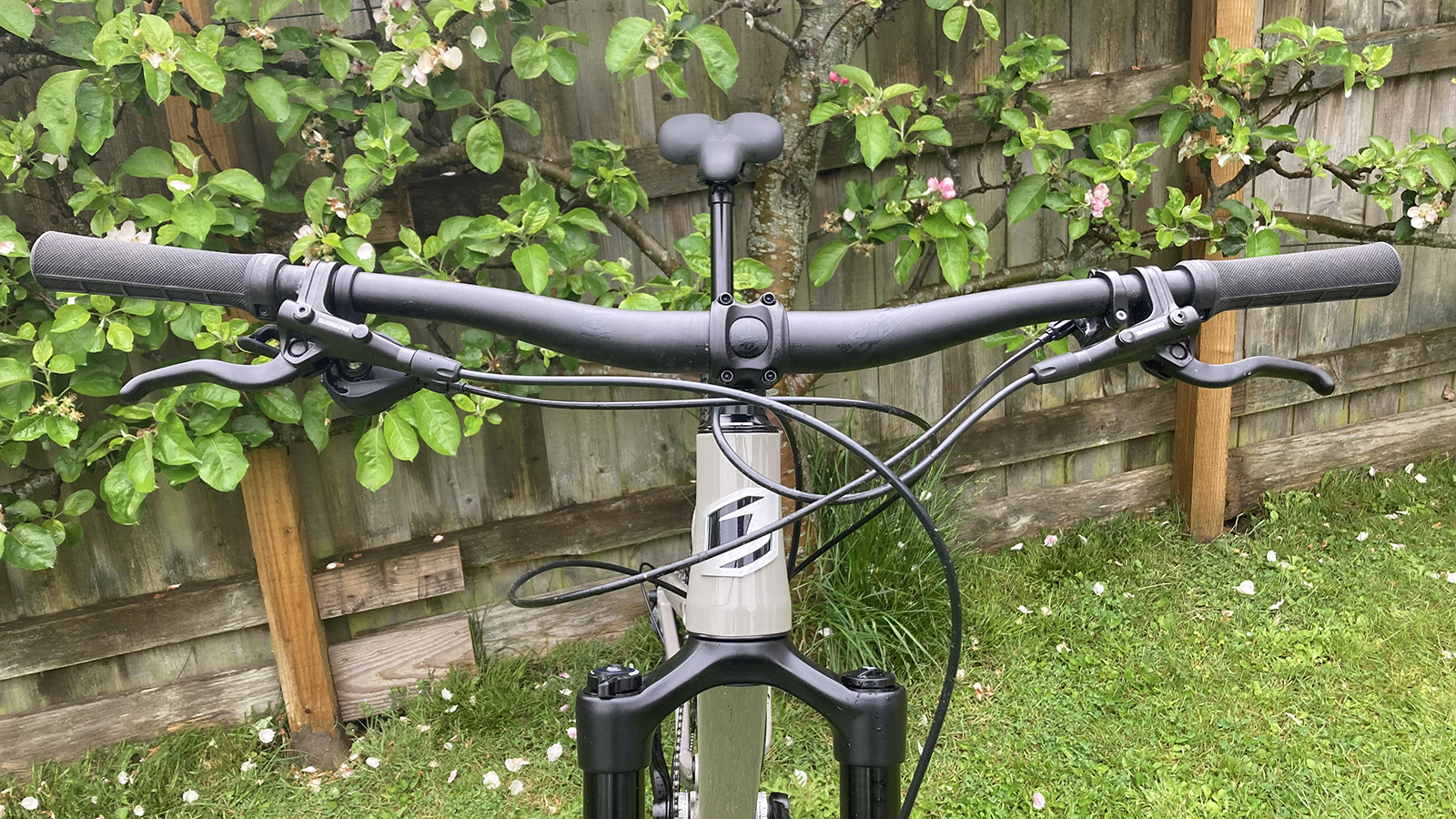
Verdict
The Faultline A1 is in its happy place on flowing, cross-country type trails, but can soon get out of its depth on steep and technical climbs and hard-hitting descents. The spec is great for the price, with premium parts used throughout, except for the problematic KMC chain which could easily be swapped out for less than £30. The seat angle geometry is all that really holds the Faultline A1 back, and seriously limits its potential on the trail.
Tech specs: Jamis Faultline A1
- Price: $2,599 / £2,350 (Members price £2100)
- Frame: Triple-butted 6061 alloy
- Fork: Rock Shox 35 Gold RL 29”
- Headset: FSA Orbit 1.5 Zero-Stack internal cup, 8mm cone spacer
- Weight: 15.1kg without pedals (size M tested)
- Sizes: S, M, L, XL
- Derailleur: Shimano SLX, 12-speed
- Shifter: Shimano SLX
- Chain: KMC X12, 12-speed
- Crankset: Race Face Ride, 32T
- Cassette: Shimano M7100, 10-51T
- BB Set: Race Face BSA
- Wheels: Stan’s No Tubes Arch D 29” tubeless rims, 32H, Shimano SLX 15x110mm front & 12x148mm rear hubs
- Tires: WTB Vigilante 29 x 2.35” Front & Trail Boss 29 x 2.25” Rear, TCS Tubeless
- Brakes: Shimano MT401 hydraulic disc, 180mm front & 160mm rear RT30 rotors
- Bar/stem: Race Face Ride, 35 x 760mm, Race Face Ride, 50mm
- Grips: Jamis Lock-On
- Seatpost: KS Rage Dropper, Southpaw remote
- Saddle: WTB Volt
- Color: Gray







